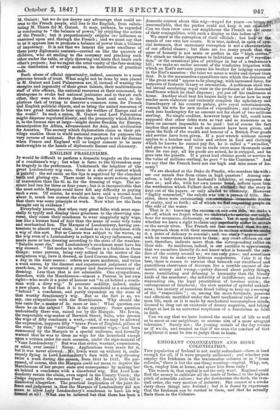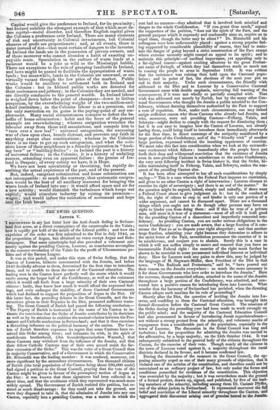EMIGRANT COLONIZATION AND HOME COLONIZATION.
Tun population of Ireland is not really redundant—there is land enough for all, if it were properly cultivated ; and whether you employ the Irishman in the transmarine colonies or in " home colonies," there is but the one thing wanting—capital. Why, not, then, employ him at home, and spare him from exile ? The reason is, that capital is not the only want. England could find the money to cultivate all the lands of Ireland to the highest pitch of scientific culture ; but she desiderates the faith, the tran- quil order, the very motives of industry. She cannot at a stroke carry those things into Ireland ; but it is found by experience that the Irishman can be carried to them, and that he actually finds them in the Colonies. 'Capital would give the preference to Ireland, for its proximity ; Int Ireland exhibits the strongest example of that which most de- ters capital—social disorder, and therefore English capital gives the Colonies a preference over Ireland. There are many elements of risk and uncertainty in Colonial investments, but Colonial chances of profit are proportionate; and, at all events, there is quiet instead of riot—that most certain of dangers to the invester. In Ireland the lands are in the possession of private owners, and of those moreover who cannot abandon a habit of exacting un- pay able rents. Speculation in the culture of waste lands at a rackrent would be a joke as wild as the Mississippi bubble. There are exceptions to the rule of grasping landlords in Ireland, and laws might be passed to facilitate the appropriation of waste lands ; but meanwhile, lands in the Colonies are unowned, or are "virtually vacant through the low price of the market. Public works would be ancillary to settlement both in Ireland and
• the Colonies : but in Ireland public works are detested for their uselessness and jobbery; in the Colonies they are needed; and are directly conducive to the general wealth. In Ireland labour is weighed down below the point of cheapness—down to listless pauperism, by the overwhelming weight of the two-million-and- a-half destitution ; in the Colonies labour is at a premium, and the only restriction en its gains is the paying-point of any em- , ployment. Many social circumstances conspire to defeat the be- nefits of home colonization : habit and the force of the general example are overwhelming ; whereas emigration wrenches the labourer away from those evil associations, and compels him to " turn over a new leaf " : universal antagonism, the unceasing war of class upon class, breeds distrust, and prevents any faith in anything except class combinations ; whereas in the Colonies -there is no time to get up such antagonism, and what the colo- nists know of their neighbours is a friendly cooperation in " husk- ing bees" or " building frolics" : in Ireland the past is a history .of universal failure ; in the Colonies, it is a history of unfailing success, attending even on apparent failure : the genius of Ire- land is Despair; of every colony we have, it is Hope.
We have not been speculating or theorizing, but rapidly de- scribing the actual experience of the past, and of the present. But, indeed, emigrant colonization and home colonization are -not incompatible : so much the contrary, that systematic emigra- tion would be the best of all auxiliary measures for bringing the waste lands of Ireland into use : it would afford space and air for a new activity ; would diminish the turbulence which keeps out capital ; would stimulate industry by raising its premium— wages ; and would infuse the animation of movement and hope into the Irish breast.



























 Previous page
Previous page